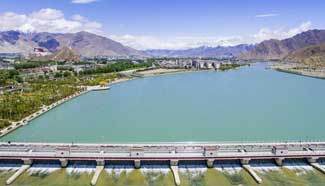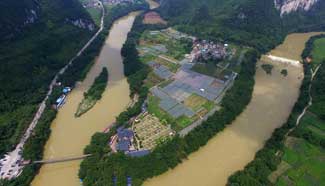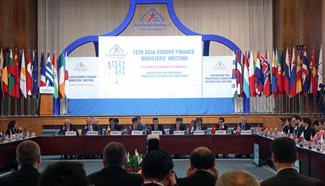BEIJING, June 10 (Xinhua) -- On 10 June 2016, the Chinese Society of International Law (CSIL) released a paper entitled The Tribunal's Award in the "South China Sea Arbitration" Initiated by the Philippines Is Null and Void. The executive summary of the paper is as follows:
On 22 January 2013, the Philippines unilaterally initiated arbitration with respect to certain issues in the South China Sea ( "Arbitration" ). China has maintained its solemn position that it would neither accept nor participate in the Arbitration, having stated that the tribunal constituted at the unilateral request of the Philippines ( "Arbitral Tribunal" or "Tribunal" ) manifestly has no jurisdiction.
On 29 October 2015, the Tribunal issued its Award on Jurisdiction and Admissibility ( "Award on Jurisdiction" or "Award" ), in which it found that it had jurisdiction over some of the Submissions made by the Philippines, and reserved consideration of its jurisdiction with respect to the other Submissions to the merits phase. This finding is full of errors in both the determination of fact and the application of law.
I. The Tribunal errs in finding that the claims made by the Philippines constitute disputes between China and the Philippines concerning the interpretation or application of the UNCLOS
According to the United Nations Convention on the Law of the Sea ( "UNCLOS" or "Convention" ), the jurisdiction of the Tribunal is limited to "disputes concerning the interpretation or application of this Convention" . To establish its jurisdiction in the present Arbitration, the Tribunal must be satisfied that disputes exist between China and the Philippines with respect to the claims made by the Philippines, and that the disputes, if they existed, concern the interpretation or application of the UNCLOS.
In international practice, to determine the existence of a dispute, it must be first demonstrated that specific subject-matters on which the parties disagree have come into existence before the judicial or arbitral proceedings are initiated, and further demonstrated that there is "clash of propositions" or "point of contention" on the same subject-matter or claim.
In its Submission No. 3, the Philippines argues that Scarborough Shoal (Huangyan Dao) generates no entitlement to an exclusive economic zone or continental shelf. In its Submission No. 4, it argues that Mischief Reef (Meiji Jiao), Second Thomas Shoal (Ren' ai Jiao) and Subi Reef (Zhubi Jiao) are low-tide elevations that do not generate entitlement to a territorial sea, exclusive economic zone or continental shelf. In its Submission No. 6, the Philippines argues that Gaven Reef (Nanxun Jiao) and Mckennan Reef (Ximen Jiao) (including Hughes Reef (Dongmen Jiao)) are low-tide elevations that do not generate entitlement to a territorial sea, exclusive economic zone or continental shelf. In its Submission No. 7, it argues that Johnson Reef (Chigua Jiao), Cuarteron Reef (Huayang Jiao) and Fiery Cross Reef (Yongshu Jiao) generate no entitlement to an exclusive economic zone or continental shelf.
In order to prove that these claims constitute disputes between China and the Philippines, the Tribunal must show, with factual proof, that prior to the initiation of arbitration the Philippines had made such claims to China and the claims had been positively opposed by China. The Tribunal should have done this, but it did not.
In fact, there exists no real "clash of propositions" between China and the Philippines with respect to the Philippines' Submissions. China has always maintained and enjoyed territorial sovereignty over and maritime entitlements of the Zhongsha Islands (including Huangyan Dao (Scarborough Shoal)) and the Nansha Islands (including the above-mentioned eight features such as Meiji Jiao (Mischief Reef)), each in their entirety. The Philippines formulates its claims regarding the status and maritime entitlements of certain individual features as separate ones. The two States have never exchanged views with respect to the subject-matters concerned in the Philippines' Submissions. These facts reflect that the propositions of China and the Philippines concern different issues and do not pertain to the same subject-matters. With no positively opposed disagreements, the relevant claims do not constitute disputes between China and the Philippines. However, the Tribunal distorts China's arguments and erroneously finds that there exist disputes between China and the Philippines with respect to the latter's relevant claims.
Even if a claim constituted a dispute, the Arbitral Tribunal would still have no jurisdiction over it if it does not concern the interpretation or application of the UNCLOS. When dealing with the Philippines' Submissions No. 1 and 2, the Tribunal finds that the relevant dispute between China and the Philippines is "a dispute about historic rights in the framework of the Convention". However, "historic rights" had come into existence long before the conclusion of the UNCLOS. They originated from and are governed by general international law including customary international law, and rules of customary international law regarding "historic rights" operate in parallel with the UNCLOS. Accordingly, disputes concerning "historic rights" do not concern the interpretation or application of the Convention. The Tribunal makes a sweeping conclusion that the relevant claims constitute a dispute concerning the interpretation or application of the UNCLOS, without identifying specific provisions to which the "dispute" relates, and whether a real link exists between the "dispute" and the specific provisions of the Convention. The Tribunal' s conclusion is thus groundless in law.











